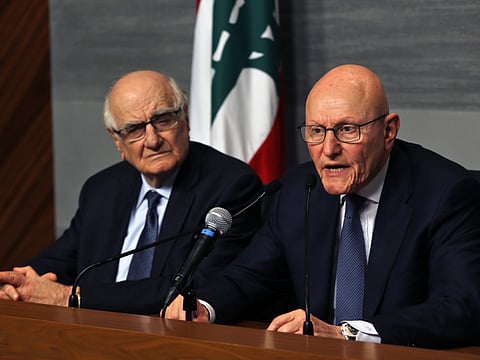Lebanon scrambles to remain relevant
Lebanese Forces leader Samir Geagea says cabinet should resign if it fails to address grave challenge

Beirut: Lebanon continues to reel under the repercussions of the Saudi decision to end its $4 billion (Dh14.4 billion) grants — $3 billion to the Lebanese Armed Forces and a $1 billion to the Internal Security Forces — with senior officials at a loss how best to make amends.
On Monday, the cabinet held a long session, after which Prime Minister Tammam Salam reaffirmed the country’s adherence to Arab consensus. While he voiced support to the Kingdom and its Gulf Arab partners, the premier saw — once again — the rug pulled from under his legs when foreign minister Jibran Bassil announced that given the choice between “Arab consensus and national unity, we side with national unity”, which assumed there was one.
It fell on Lebanese Forces leader Samir Geagea to lament this inconsistency. On Tuesday, the former March 14 presidential candidate asserted that the cabinet “failed to hit the nail on the head” regarding Hezbollah’s involvement in foreign conflicts and called on it to resign “if it cannot properly resolve [the party’s] fighting in conflicts abroad”.
March 8 tenors went all out attacking those who stood with Riyadh, continuing to issue virulent criticisms of the kingdom and the UAE and their roles in the Yemen and Syria wars. Bassil called on Saudi Arabia to understand the country’s position but did not find it necessary to make a similar request from Iran. There was no mention of Hezbollah’s own participation in the Syrian Civil War, nor of its documented meddling in the affairs of Iraq, Bahrain and Yemen.
While March 14 leaders gathered under the chairmanship of former Prime Minister Sa’ad Hariri to clarify various positions, their declaration did not go beyond the symbolic. It fell on Geagea to highlight the significant differences between what the cabinet described and what Hezbollah continued to do on the ground. “A state should operate with at least an amount of logic,” Geagea remarked sarcastically, adding: “The situation in Lebanon is going from bad to worse, partially because of Hezbollah’s foreign meddling and mainly due to [its] usurpation of the state’s voice”.
Bewildered Lebanese citizens were fascinated with the “Arab unity vs. national unity” debate, oblivious to the fact that the latter required domestic consensus. A captain in the Lebanese Army who requested anonymity avowed that “national unity means everyone stands with legitimate institutions, but this is not the case because Hezbollah does not want a strong army. So what kind of unity are they talking about?”
Micheline Abboud, a saleswoman, was equally perplexed: “Ours is an existential struggle that hovers around the kind of society we require. We want prosperity and stability,” she said, “they prefer subservience to Iran”.



